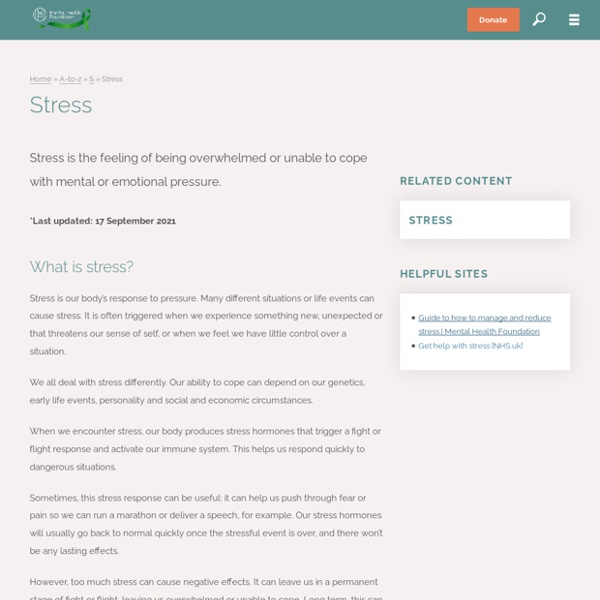Types of Stress
Understanding stress can help you know more quickly when you need help. Stress is our built-in response to danger, a surge in hormones as we choose between fighting, fleeing, or freezing. The danger may be real or imagined, immediate or farther away; our bodies don’t know the difference.
Psychology Today Singapore
Teens are under more stress today than ever before. Sound like an exaggeration? Despite the fact that I am often prone to hyperbole, consider this: being a teenager is not easy. Adolescence has always been a tricky developmental period defined by fundamental yet somewhat difficult changes (physical, cognitive, and social) experienced by teens as they make their way from childhood toward adulthood. These transitions trigger changes in the way the teen sees him/herself, and the way that others see and treat him or her.
How Stress Affects Your Mental Health
Researchers at the Society for Neuroscience meeting in New Orleans (Oct 13-17) presented studies showing how stress, no matter its cause, alters brain circuitry in ways that can have long-term effects on mental health. Research by Dipesh Chaudhury of the Mount Sinai School of Medicine in New York shows that traumatic events appear to cause depression by derailing the brain's so-called reward system, which normally causes pleasurable feelings whenever we engage in fun activities like spending time with friends. People who have suffered major stress, such as soldiers returning from combat, often report that they no longer find pleasure in these things. Mice respond in a similar way to traumatic events, Chaudhury says.
11 Signs and Symptoms of Too Much Stress
Stress is defined as a state of mental or emotional strain caused by adverse circumstances. At one point or another, most people deal with feelings of stress. In fact, one study found that 33% of adults reported experiencing high levels of perceived stress ().
The Cause of Stress: Types of Stressors
By Mary Elizabeth Dean Updated November 15, 2019 Reviewer Heather Cashell Stress is a part of everyday life, but if most of us had our way, it wouldn't even exist. We hear the word stress often. People say, "I'm under so much stress!"
Stress and teenagers - ReachOut Parents
It’s very common for young people to feel stressed out from time to time. Stress is a normal part of life and can even be beneficial in some situations. However, if you’re worried that your child is under a lot of stress and it’s been going on for a while or is affecting their everyday life, there are things you can do to help them.
Stress effects on the body
Musculoskeletal system When the body is stressed, muscles tense up. Muscle tension is almost a reflex reaction to stress — the body's way of guarding against injury and pain. With sudden onset stress, the muscles tense up all at once, and then release their tension when the stress passes. Chronic stress
Columbia River Mental Health Services
Stress management can be complicated and confusing because there are different types of stress — acute stress, episodic acute stress, and chronic stress — each with its own characteristics, symptoms, duration and treatment approaches. Let’s look at each one. Acute stress is the most common form of stress.
How does Stressors become Stress?: Cognitive Appraisal
According to Richard Lazarus, stress is a two-way process; it involves the production of stressors by the environment, and the response of an individual subjected to these stressors. His conception regarding stress led to the theory of cognitive appraisal. What is Cognitive Appraisal? Lazarus stated that cognitive appraisal occurs when a person considers two major factors that majorly contribute in his response to stress.



